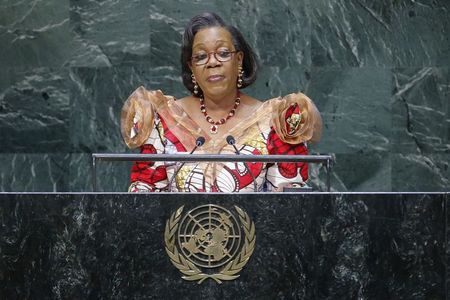By Michelle Nichols
UNITED NATIONS (Reuters) - Central African Republic interim President Catherine Samba Panza asked the United Nations on Saturday to consider tweaking an arms embargo on the landlocked state so its security forces could be properly equipped to work alongside U.N. peacekeepers.
An "anti-balaka" Christian militia took up arms last year in response to months of looting and killing by mostly Muslim Seleka rebels after they toppled President Francois Bozize and seized power in March 2013.
In December, the Security Council imposed an arms embargo on the Central African Republic and imposed sanctions in May on Bozize and two other men linked to the conflict in the mineral-rich country of 4.6 million people.
"I should here like to ask for the understanding of the sanctions committee to ensure that the arms embargo imposed on the Central African Republic be reassessed and re-examined," Samba Panza told the General Assembly.
She was elected interim president by a transitional assembly in January as part of a plan to restore order.
Thousands have been killed and more than a million people displaced by the violence. The United Nations took over an African Union peacekeeping mission last week and plans to roughly double the force to about 12,000 troops.
"We place great hope in the deployment of this mission, a mission which will contribute to - in an effective way - securing our country and sustainable development," she said.
"It remains true, however, that the success of this mission will also hinge on the involvement at its side of the national security and defence forces likely to lend support to this mission as a result of their intimate knowledge of the ground," Samba Panza said.
Members of a 6,000-strong African Union peacekeeping force, which has struggled alongside some 2,000 French troops to restore order, were rehatted as U.N. troops on Sept. 15 and will be joined by soldiers from elsewhere, including Morocco, Bangladesh and Pakistan.
U.N. peacekeeping chief Herve Ladsous said on Saturday he believed the mission in Central African Republic was doing "pretty well" for less than two weeks on the job.
"Of course, one can always say we should have done better," Ladsous told reporters.
"But I think we are doing pretty well and already we have established our regional headquarters in three parts of the country. We are establishing bases in a number of prefectures, according to the security needs," he said.

The International Criminal Court said this week it had opened an investigation into allegations of murder, rape and the recruiting of child soldiers in the Central African Republic over the past two years.
(Additional reporting by Louis Charbonneau; Editing by Peter Cooney)
